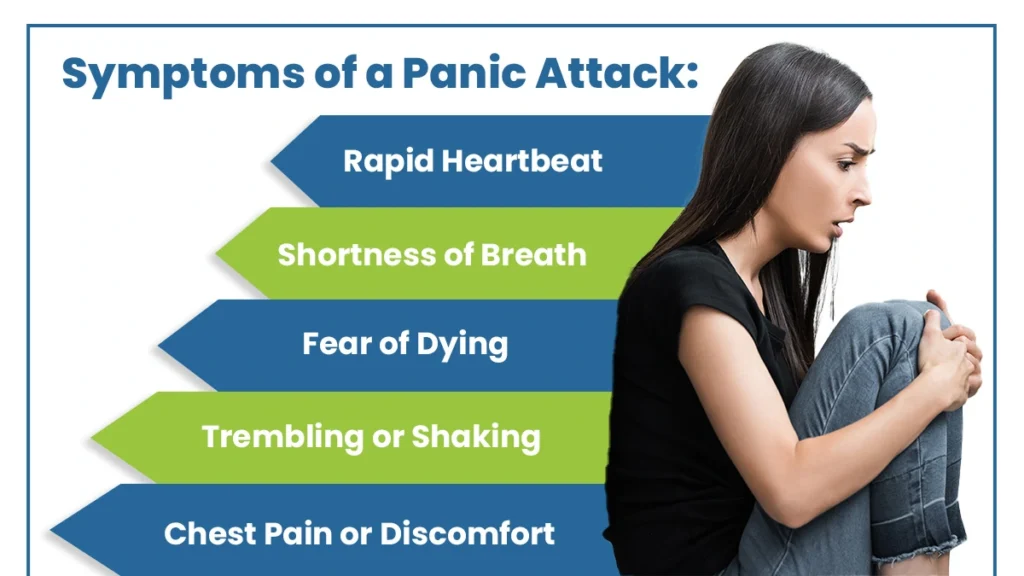Panic disorder is a sudden and unpredictable storm of anxiety that disrupts the mind, making individuals feel a range of physical symptoms such as a racing heart, sweating, and shallow breathing.
This complex condition goes beyond regular nervousness. It is a combination of various symptoms that culminate into a tumultuous and overwhelming experience of panic and dread. In this article, we delve into the intricacies of how anxiety manifests in this disorder, leaving a lasting impact on those who struggle with its challenging nature.
Key Takeaways
Panic disorder is an intense storm of anxiety that throws people into a vortex of fear. Here’s what you need to know:
- Panic disorder results from a mix of genetic, psychological, and environmental factors.
- Identify the difference between panic attacks and panic disorder. Recurrent, unexpected episodes characterize the latter.
- Treatment options, from therapy to medication, provide solutions for managing panic disorder, offering hope for those affected.
The Haven Detox-Little Rock is your haven for rediscovering serenity and conquering panic disorder. Contact us at (501) 271-3342 to explore mental health services.
Panic Attacks: Learning the Truth
Panic attacks are the main characteristic of panic disorder. These episodes of intense fear and anxiety can occur suddenly and without any apparent trigger. They can be so severe that they lead to physical and emotional distress. It’s crucial to differentiate between panic attacks and panic disorder as they are not the same.
Panic disorder can affect individuals of all ages, and its hallmark symptom is experiencing recurrent and unexpected panic attacks. These attacks bring on intense physical symptoms, often resembling those of a heart attack, which can be distressing for both adults and children. Medications and therapy are commonly used to manage these symptoms and improve the overall well-being of individuals with panic disorder.
Symptoms of Panic Attack

During a panic attack, individuals may experience a range of following symptoms, including:
Rapid Heartbeat: Your heart may race and feel like it’s pounding out of your chest.
Shortness of Breath: It can feel like you cannot catch your breath, leading to a sensation of suffocation.
Sweating: Profuse sweating is common during panic attacks.
Trembling or Shaking: Uncontrollable trembling or shaking may occur, often in response to the heightened anxiety.
Chest Pain or Discomfort: Many people describe chest pain, which may be misperceived as a heart attack.
Nausea or Upset Stomach: Digestive symptoms, such as nausea or an upset stomach, can be part of a panic attack.
Dizziness or Lightheadedness: You may feel dizzy or as if you’re about to faint.
Feeling Detached from Reality: A sense of unreality or detachment from your surroundings, known as depersonalization or derealization, can occur.
Fear of Dying: Panic attacks often bring an intense fear of dying, losing control, or going insane.
The understanding of these distressing symptoms of a panic attack and psychotherapy is crucial in addressing this condition effectively and seeking the appropriate support and treatment.
Types of Panic Attacks
There are different types of panic attacks, and individuals with panic disorder may experience one or more of the following:
Unexpected Panic Attacks: These occur without a specific trigger and can happen anytime.
Situationally Bound Panic Attacks: These are linked to a particular situation or object, like flying, heights, or public speaking.
Situationally Predisposed Panic Attacks: While not consistently linked to a specific situation, these attacks are more likely to happen in certain circumstances, such as when stressed.
Nocturnal Panic Attacks: These occur during sleep and can wake you up with intense anxiety.
The various types of panic attacks are essential for managing panic disorder. It allows for targeted strategies and supports to address these distinct challenges.
Difference Between Panic Attacks and Panic Disorder
It’s essential to understand the distinction between panic attacks and panic disorder. A panic attack is a disjunct episode of extreme fear or discomfort, while panic disorder involves recurrent and unexpected panic attacks. If you experience occasional panic attacks and live in constant fear of having more, you may have panic disorder.
Risk Factors for Panic Disorder
Several factors can contribute to the development of panic disorder, including genetic, environmental, and lifestyle factors.
Genetic Factors: Genetics play a pivotal role in developing panic disorder. If you have a family history of anxiety disorders or panic attacks, you may be at a higher risk.
Environmental Factors: Traumatic events, such as the loss of a loved one, a meaningful life change, or a traumatic experience, can trigger panic attacks or contribute to the development of panic disorder.
Lifestyle Factors: Particular lifestyle factors can also increase the risk of panic disorder, such as excessive caffeine or alcohol consumption, as well as smoking. Additionally, chronic stress, lack of physical activity, and poor sleep behaviors can make you more susceptible.
Treatment Options for Panic Disorder
Panic disorder is a highly curable condition, and several effective treatment options are available with medical help. These include therapy, medication, and self-care strategies.
Therapy
One of the most popular methods for treating panic disorder is cognitive behavioral therapy (CBT). CBT helps individuals understand and manage their panic attacks by identifying triggers, changing thought patterns, and developing coping strategies. Exposure therapy, a form of CBT, can also be helpful for gradually facing and overcoming specific fears or phobias that trigger panic attacks.
Medication
Doctors may prescribe medications to help manage panic disorder. A healthcare professional may prescribe antidepressants like benzodiazepines and selective serotonin reuptake inhibitors (SSRIs) to alleviate symptoms and control the recurrence of panic attacks. Working closely with a healthcare expert to determine the most suited medication and dosage for your specific needs is essential.
Self-Care
Self-care is an essential component of managing panic disorder. Some self-care strategies to consider include:
Stress Reduction: Try relaxation techniques like meditation, deep breathing, or yoga to reduce stress.
Healthy Lifestyle: Maintain a balanced diet, exercise regularly, and ensure you’re getting enough sleep.
Limiting Stimulants: Reduce or eliminate the consumption of caffeine and alcohol, as they can exacerbate anxiety.
Stay Informed: Educate yourself about panic disorder and the treatment options available. Knowing what to expect can alleviate anxiety.
Blending self-care strategies into your daily routine is a fundamental step in effectively managing panic disorder. It promotes overall well-being and achieving a sense of control over your condition.
Resources for Living With Panic Disorder
If you or someone you know is living with panic disorder, there are numerous resources available to provide support and information:
Therapists and Counselors: Seek professional help from a therapist or psychiatrist experienced in treating anxiety disorders.
Support Groups: Join a local or online support group where you can connect with others who share similar experiences.
National Alliance on Mental Illness (NAMI): Organizations like the National Alliance on Mental Illness (NAMI) offer valuable information and resources for people living with mental health conditions.
Books and Online Resources: Many books, websites, and forums can provide additional insights and guidance on coping with panic disorder.
With the proper treatment, including therapy, medication, and self-care, it is possible to manage panic disorder and lead a fulfilling life. Resources and support are available to help with recovery.
Frequently Asked Questions (FAQ)
What exactly is panic disorder?
Panic disorder (a type of anxiety disorder) leads to recurrent and unexpected panic attacks marked by intense physical symptoms. These symptoms often mirror those of a heart attack, including a racing heart rate, chest pain, and shortness of breath.
Panic attacks typically occur without any real danger and can last several minutes. These episodes can be so distressing that individuals may develop agoraphobia, avoiding places or situations where an attack might happen.
Still, the exact cause of panic disorder is not fully understood. Certain factors, such as psychological issues, family history, and life events, may contribute to its development.
Both men and women can be affected, with symptoms often emerging in early adulthood. Medical care, psychological favors, and medications can help manage and treat this challenging medical condition.
What is the leading cause of panic disorder?
The primary cause of panic disorder is not attributed to a single factor but rather a complex interplay of various elements. Research suggests that genetic predisposition, psychological factors, and environmental stressors contribute to its development.
Individuals with a family history of panic disorder may be more susceptible. Traumatic life events or excessive stress can also trigger or exacerbate symptoms. The Diagnostic and Statistical Manual of Mental Disorders provides guidelines for diagnosis, focusing on recurrent and unexpected panic attacks as the hallmark symptom.
Elevate Your Wellness With The Haven Detox-Little Rock
Our experts are committed to your well-being and improved mental health, offering tailored support to manage conditions like panic disorder.
We understand that addiction is a menace that can often come as a by-product of mental health issues. We aim to extend a helping hand with a residential support and detox program that ensures a smooth and secure transition, emphasizing your comfort and care in an environment that meets your needs.
Wait no longer. Rediscover wellness with us. Contact (501) 271-3342 today to schedule an appointment with a counselor.



